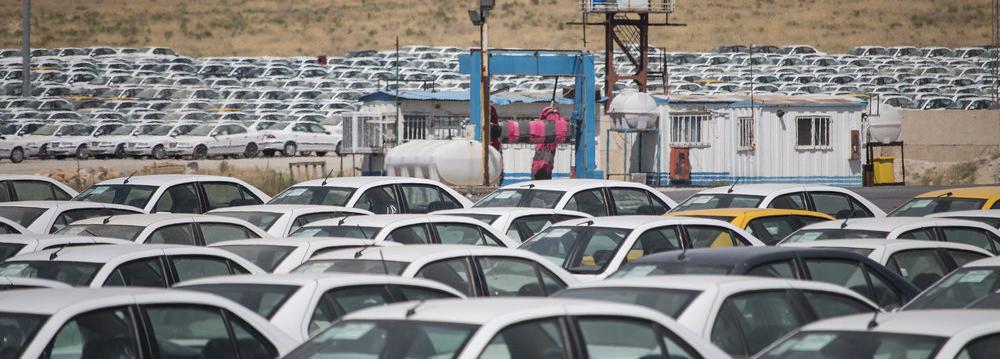Cautioning potential car buyers against widespread malpractices in the market, the head of the local Auto Dealers Association made a long story short: The auto market is derailed.
Saeed Motemani says, “The market is not properly regulated and the existing legal mechanisms are inefficient.” He is not alone in his opinion. The people, independent market observers and almost everyone with knowledge about the key auto industry and its abject failures are of the opinion that this sector is plagued with greed, chronic corruption and rent-seeking.
As one example of the fraudulent practices that have permeated the car industry, Motemani said, “Auto imports have been banned (since June). However, some firms with their bizarre advertisement campaigns are pre-selling vehicles they don’t have and cannot bring into the country,” local automotive website Asbe Bokhar reported.
In a desperate move aimed at preserving the dwindling currency reserves, the government in Tehran introduced drastic measures to curb spending, including a ban on all luxury items and import of foreign cars was obviously not spared. The bans are expected to be extended into the next fiscal year that begins in March.
Motemani says the problem is not limited to imported vehicles. “Simply put, there is no oversight in the auto sector” and the market has plunged into a full-fledged chaos with everyone trying to make an easy buck.
Cautioning customers against the prevalent malpractices, Motemani says, “Don’t preorder vehicles! Don’t pay upfront! If the dealer cannot deliver the car on the spot, don't pay a dime.”
Price Hikes
Motemani is not alone in the frustration and bewilderment that goes far beyond the discredited business of importing cars. Over the past few months local automakers have introduced new policies that many have slammed as unscrupulous. For instance, at the weekend Iran Khodro increased factory prices of three models including vehicles based on Peugeot 405 and Renault Logan.
The company raised the price of a face-lifted version of Peugeot 405 with automatic gearbox, locally known as Peugeot Pars, from 540 million rials ($5,250) to 83 million rials ($8,050), a whopping 54% increase.
IKCO’s decision to increase factory prices of three cars to such high levels was in the extreme and pushed car prices even higher in the market full of frenzy. On Wednesday the Peugeot Pars cost 950 million rials ($9,220) in Tehran – a price tag never ever conceived even by the most pessimistic pundits and uncompromising critics of the dysfunctional local auto sector!
The well-read Persian economic daily Donya-e-Eqtesad on Wednesday speculated that car companies have received a green light from the government to increase prices. However, in a move aimed at gauging the response of the chaotic market and consumers to the higher prices, the increases have been limited to a few models.
IKCO has also announced that cars presold at the new prices will be delivered in a few weeks after customers put an order with the firm. This is while those who had preordered vehicles months ago are reporting extended delays in deliveries.
Head of Kermanshah Province Consumers Protection Association Abdolreza Yari says, “Carmakers have delayed delivery of vehicles they presold months ago, claiming that they don’t have enough parts. After jacking up prices one of the companies is delivering vehicles at very short notice. How can this be possible?! This is an outright insult to the intelligence of consumers and the general public.”
State Support
Seemingly, the carmakers have government support for raising prices. The industries minister has said the price increases are “within legal boundaries.” Reza Rahmani says that IKCO has announced prices for models that were exempt from government price regulations. Therefore, the company did not need special permits to do what it is doing with car prices.
According to the minister, vehicles have been categorized into two groups: costing under 450 million rials ($4,360) and above. The new prices that are under the 450-million-rial threshold will be set by a government task force led by the Consumer and Producer Protection Organization, and another state body, the Market Regulatory Authority, an ad hoc committee, created to check inflation and price gauging.
Rahmani said, “For the rest of the vehicles, companies are permitted to set factory prices 5% lower than the market price.”
Parliamentary Probe
A lawmaker from Shiraz, Bahram Parsaei, says that on Sunday a meeting will be held by the Majlis Article 90 Commission (which handles complaints) to study the recent price hikes and the delays in delivery of presold cars.
“By launching (unprecedented) presale schemes, carmakers are charging at their wish and whim. The Majlis Article 90 Commission has been investigating automakers (for months). The results of the investigation will be published soon.”
The MP recalled that “Over the past year, auto companies have failed to meet their commitments. They are deep in the red. They owe 200 trillion rials ($1.9 billion) to parts makers and another 300 trillion rials ($2.9 billion) to banks. They have accumulated losses amounting to 150 trillion rials ($1.4 billion).” He adds that despite the deep crisis “the companies have presold thousands of vehicles, raking in billions for cars for which there is no date of delivery.”
The industries minister, and directors of major automotive companies, along with representatives from the General Inspection Organization of Iran, the 'Tazirat' organization (a judiciary-affiliated ombudsman dealing with trading offenses), and Islamic Republic of Iran Customs Administration will attend the Majlis meeting.
Earlier, the MP tweeted, “With the false pretext of supporting local production, the auto industry has pushed for a ban on car imports and outrageous tariffs” on foreign cars.
“They [the automakers] have an ironclad monopoly over the market. Devoid of other options, people are forced to buy the substandard local cars. Is this really support for domestic manufactures or taking a nation hostage and robbing them of their wealth?”


